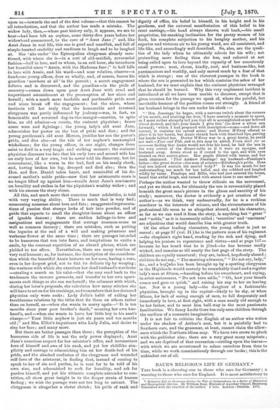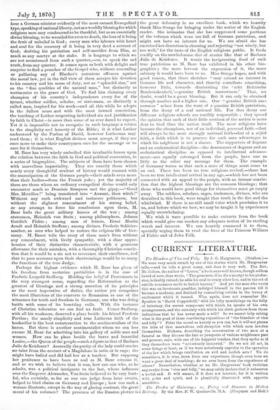BAUR'S RELIGIOUS LIFE IN GERMANY.* THIS book is a cheering
one to those who care for Germany ; a warning to those who care for England. It is most satisfactory to
* Religious Life in Germany during the ll'ar of Independence, in a Series of Historical and Biographical Sketches, By William Baur, klinisterof Anochar Chapel, Hamburg. Translated with the sanction of the author. 2 vols. London : Stratum. 1870. hear a German minister evidently of the most earnest Evangelical type, speaking of national liberty, not as a worldly blessing for which religious men may condescend to be thankful, but as an essentially divine blessing, to be wrestled for even to death, the loss of it being the fruit of unbelief in God ; every man who labours with heart and soul for the recovery of it being in very deed a servant of God; deriving his patriotism and self-sacrifice from Him, as much as any martyr at the stake. It is language to which we are not accustomed from such a quarter,—or, to speak the sad truth, from any quarter. It comes upon us both with delight and surprise to find a preacher of the Gospel who, without concealing or palliating any of Blucher's notorious offences against -the moral law, yet in the full view of them accepts his devotion to his country and his sense of duty, not as "splendid sins," not as the "fine qualities of the natural man," but distinctly as testimonies to the grace of God. To find him claiming every champion of his country's independence every foe of the tyrant, whether soldier, scholar, or statesman, as distinctly a called man, inspired for his work—and all this while he adopts in the fullest sense and with the most inward conviction, the teachi g of Luther respecting individual in and justification by faith in Christ—is more than some of us ever dared to expect. Yet it is impossible not to recognize in such language a return to the simplicity and honesty of the Bible ; it is what Luther understood by the Psalms of David, however Lutherans may read them ; it is what English divines must accept, if they are -once more to make their countrymen care for the message or to care for it themselves.
M. Baur has very wisely embodied this invaluable lesson upon the relation between the faith in God and political renovation, in a series of biographies. The subjects of them have been chosen -with marvellous impartiality. They are exactly those which nearly every thoughtful student of history would connect with the emancipation of the German people—their minds even more than their bodies—from the French yoke ; yet the majority of them are those whom an ordinary evangelical divine would only encounter much as Dominie Sampson met the gipsy,—" Good Mrs. Merrilies !" being translated into " Avaunt, thou witch !" Without any such awkward and insincere politeness, but without the slightest concealment of his strong belief, or any attempt to force his conclusions upon them, M. Baur hails the great military heroes of the war ; among statesmen, Heinrich von Stein ; among philosophers, Johann Gottlieb Fichte ; among men of letters, Ernst Moritz Arndt and Heinrich Steffens ; among divines, Frederic Schleier- macher, as men who helped to restore the religious life of Ger- many. M. Bauer tells the story of these men's lives without any concealment, with lively sympathy, with a clear appre- hension of their distinctive characteristic, with a generous allowance for their mistakes, with a thoroughly Christian convic- tion that it would be a sin not to reverence their excellence, and that to pass sentence upon their shortcomings would be to usurp the functions of the true Judge.
Perhaps the highest evidence which M. Baur has given of his freedom from sectarian partialities is in the case of Frederic Leopold Stolberg. Holding the belief of Protestants in the very strongest sense, regarding the Reformation as the greatest of blessings and a strong assertion of its principles as the most imperative of duties, the author yet recognizes the most illustrious of the converts to Romanism as one of the witnesses for- truth and freedom in Germany, one who was doing battle with some of its besetting evils. With this instance of Christian toleration we can find no fault. Count Stolberg, with all his weakness, deserved a place beside his friend Frederic Perthes ; the manly simplicity and true Lutheran faith of the bookseller is the best counteraction to the sentimentalism of the baron. But there is another sentimentalist whom we can less -excuse M. Baur for admitting into his gallery of noble men and women. How can he place beside the brave and beautiful Louise,—the Queen of the people—such a figure as that of Barbara Julie de Kriidener? Assuredly the purity of the lady could receive no taint from the contact of a Magdalene in satin or in rags; she might have hailed and did hail her as a teacher. But supposng her penitence to have been as real as M. Baur esteems it, and as we wish to believe that it was, how can one who, as he admits, was a political intrigante to the last, whose influence over the Emperor Alexander, Von Stein believed to be very hurt- ful, who certainly, as far as one can judge from later events, with point and spirit, and is plentifully illustrated with apposite helped to bind chains on Germany and Europe ; how can such a anecdotes.
woman illustrate, except in the way of glaring contrast, the great The Pardon of Guincamp ; or, Poetry and Romance in Modern moral of his volumes? The presence of the Russian plotter is I Brittany. By the Rev. P. W. Quetteville, M.A. (Chapman and Hall.) the great deformity in an excellent book, which we heartily thank Miss Sturge for bringing under the notice of the English reader. She intimates that she has suppressed some portions of the volumes which. were too full of German patriotism, and might not have an interest for us. We are afraid she has exercised her discretion in choosing and rejecting "not wisely, but too well," for the taste of the English religious public. It feeds readily on the unwholesome diet of stories like that of Barbara Julie de Kriidener. It wants the invigorating food of such true patriotism as M. Baur has exhibited in his other bio- graphies; the more fervent the expression of it, the more salutary it would have been to us. Miss Sturge hopes, and with good reason, that these sketches "may extend an interest in German life and character, and thereby contribute scimetking, however little, towards diminishing the kat Brittische Beschriinkenheit,'—genuine British narrowness." That, no doubt, would be a great blessing. But it can only be obtained through another and a higher one. Our "genuine British nar- rowness" arises from the want of a genuine British patriotism, from the decay of a real national life. For that decay our different religious schools are terribly responsible ; they spread the opinion that each of their little sections of the nation is more dear to God than the nation itself. The most religious have become the champions, not of an individual, personal faith—that will always be the most strongly national faith—but of a selfish faith, a faith which is to procure for each man advantages in which his neighbour is not a sharer. The supporters of dogmas and an ecclesiastical discipline—the denouncers of dogmas and an ecclesiastical discipline as opposed to intellectual advance- ment—are equally estranged from the people, have one as little as the other any message for them. The example of Germany warns us that such a state of things must come to an end. There has been no true religious revival,—there has been no true intellectual revival in any age,—which has not been connected with an appeal to the people, with an intense convic- tion that the highest blessings are the common blessings ; that those who would have good things for themselves must go empty away. The soldiers, scholars, sages, tradesmen, divines, who are described in this book, were taught that truth in the fire and the whirlwind. If there is no still small voice which proclaims it to us, and before which we bow, we may be taught it by experiences equally overwhelming.
We wish it were possible to make extracts from the book which would give our readers any adequate notion of its sterling worth and interest. We can heartily commend it to them, specially urging them to read the lives of the Princess William of Fichte and of John Falk.































 Previous page
Previous page